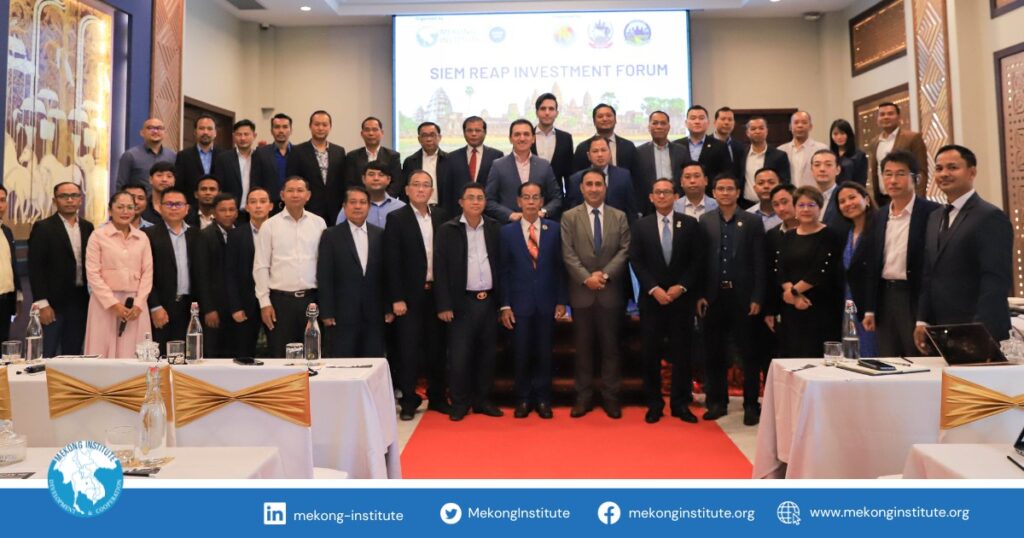Mekong Institute (MI), in partnership with local government authorities, hosted investment forums in the heritage cities of Siem Reap in Cambodia and Hue in Vietnam from November 20 to 21 and December 11 to 12, respectively. These events, two of a five-part series that included successful forums in Ayutthaya, Thailand, and Luang Prabang, Lao PDR, and an upcoming forum in Bagan, Myanmar, marked a crucial step toward fostering sustainable and smart-city initiatives through strategic collaborations among key stakeholders.
Both forums brought together investors and development partners from the Republic of Korea and the participating countries. Key local stakeholders included representatives from provincial government offices, the tourism department, monument and heritage administrations, business associations, chambers of commerce, local investors, and tourism and hospitality education providers.
The forums aimed to address the unique needs of identified heritage provinces while championing the transfer of technology, skills development, and forging alliances that yield mutual benefits through investing in sustainable and smart cities.
H. E. Tes Chankiri, a Siem Reap Provincial Council member, delivered special remarks during the Siem Reap Investment Forum held at the Memoire Palace Resort and Spa. “Backed by the Japan International Cooperation Agency (JICA) and Japan’s Ministry of Land, Infrastructure, Transport and Tourism, our smart city projects promise transformative impact in tourism, mobility, security, and waste management. Siem Reap welcomes investors to contribute to our continued prosperity. Your investment is a commitment to our shared goals of sustainable development and economic success,” H. E. Tes said during the forum, inviting investors to join the city’s journey of growth and innovation.
Among the highlights of the Siem Reap Investment Forum are presentations on sustainable investment opportunities by the private sector. Sessions covered diverse topics such as Siem Reap’s smart city trajectory, economic opportunities, and challenges presented by the provincial administration. Presentations included discussions on human resource development for the hospitality sector, international market expansion of Siem Reap’s whiskey product, and sustainable investment opportunities from the private sector.
Speaking at the Hue Investment Forum held in Indochine Palace Hotel, Ms. Nguyen Van Phuc, the Director of Vietnam’s Tourism Department, highlights Hue’s rich cultural heritage and UNESCO-recognized monuments as well as the recent inauguration of the Phu Bai International Airport, opening further the city’s international tourism market. Director Phuc envisions Hue as a smart and sustainable tourism destination, fostering collaboration with potential investors from South Korea, Thailand, and the Mekong region.
“While the Mekong region attracts millions of visitors annually, the growth poses challenges in heritage conservation and environmental protection. There is a need for responsible and sustainable tourism, leveraging technology and innovation to raise awareness among communities and visitors. Regional authorities are adopting a balanced approach, considering the impact on society, environment, and economy,” explained Ms. Nguyen.
Hue Investment Forum delved into the theme of smart services and green tourism, where Vietnam’s Department of Tourism discussed Hue as the destination for smart service experiences in hospitality. Representatives from the Hue Tourism College (HUETC) underlined the college’s position as a powerhouse in hospitality education.
Both forums featured business profile introductions and structured networking sessions between local stakeholders and investors/development partners, offering a platform for collaboration and partnerships.
These investment partnerships target to transcend traditional financial commitments. More importantly, these are commitments to environmental sustainability, heritage preservation, and livelihood enhancement. This collaboration has the potential to revolutionize infrastructure, preserve cultural heritage, create employment opportunities, and champion responsible tourism principles for generations to come.
Participants visited heritage sites and key business locations, providing further insights into heritage cities’ economies and an overview of their tourism market.
The investment forums are part of MI’s three-year project called the “Sustainable and Smart Tourism Development in the Mekong Region,” with the support of the Mekong-Republic of Korea Cooperation Fund (MKCF). The project promotes and introduces smart tourism tools, techniques, and technologies through several activities including modular training, coaching and mentorship programs, curriculum development, city roadshows, exchange programs, structured learning visits, knowledge-sharing seminars, and investment forums.








